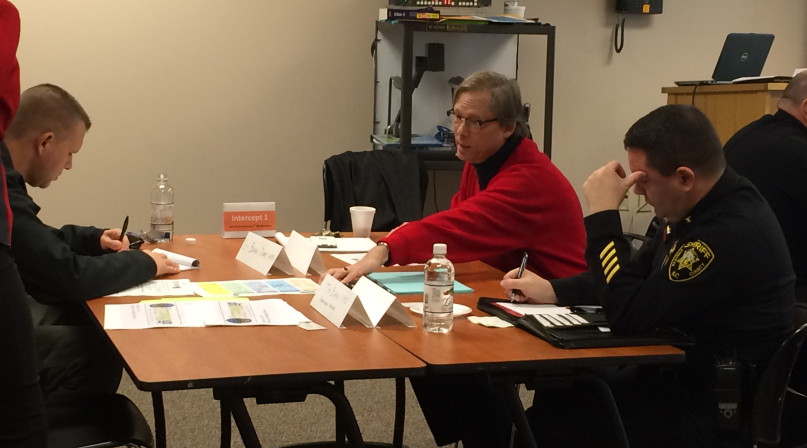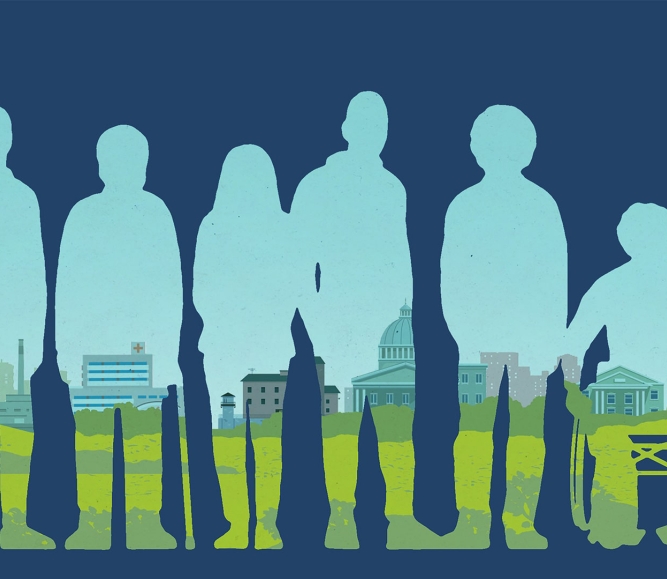Forsyth County, N.C. launches first new Stepping Up program

The first county program inspired by the national Stepping Up Initiative is taking shape in Forsyth County, N.C.
Roughly 100 female inmates in the county jail will be part of a pilot project to match them with services to treat mental illness and behavioral health problems to make sure they are rehabilitated while they are incarcerated, or perhaps in lieu of jail time, if appropriate.
“A lot of them are mothers, and their mental health impacts the well-being of their children and families,” said Commissioner Gloria Whisenhunt. “A little help can go a long way with this population.”
Forysth County wants to select a screening system, develop a discharge plan that hands off female offenders to appropriate services and form data sharing agreements with service providers.
The county has already committed $50,000 to the project and is in the process of applying for a total of $150,000 in local grants to fund two staff positions for the program.
Whisenhunt caught wind of Stepping Up during a NACo Healthy Counties Advisory Board meeting in 2015 and wanted to put it into practice at home.
“I was extremely interested,” she said. “I wanted to see if it could make a difference.”
The county needed something to help. At one point, 171 inmates out of 719 in the Forsyth County Jail, near Winston-Salem, had received positive mental health diagnoses, indicating a problem, and more and more were being prescribed psychotropic drugs.
“We had to do something,” Whisenhunt said.
That mandate has gone a long way. Deputy County Administrator Ronda Tatum credited Whisenhunt’s fervor with making the county’s participation a reality, particularly winning over her colleagues on the County Board.
“She was a big advocate, and unless we had someone on the Board fighting for this, this wouldn’t have stood a chance,” she said.
The county is already planning to make use of a 24-hour crisis center opening in January 2017, but that will be open to all nonviolent offenders, not just women.
Tatum took on the Stepping Up program’s coordination from an organizational perspective, but wanted expert help from a psychologist, Doris Paez, who came on part time.
“Doris took over everything that was over my head in the clinical sense, and she brought our focus to what really mattered here,” she said. “Throughout this process, we’ve wanted to keep things manageable.
“At first we were going to go after the frequent flyers (in the jail), but then we figured out how big that group was and we realized it was going to be huge. We needed a smaller pilot population if we wanted to figure this out — be successful with them before we move on.”
The settled on the women in the jail, a population that rarely tops 100.
And that smaller, more manageable approach was the rule outside of the jail, too. A four-person core team comprises the four perspectives needed to craft a Stepping Up program: mental health, data and research, budget and policy.
Though the core team was small, it did not exclude anyone from offering input. Their meetings focused on dreams for the program, the data the county had and the decision they group had to make about moving forward.
“We were wary about overscheduling, having too many meetings,” Paez said. “In fact, we set three big meetings and decided that was going to be it. We would come to decisions then and not keep kicking them down the road.”
Sticking to the sequential intercept model, the framework of opportunities to come in contact with a person with mental illness, the core team settled on intercepting participants while they are in the court system.
“There will be things we can address from the get-go, while they’re in jail,” Tatum said. “Things that might be as simple as adjust medication levels, because it’s not uncommon to have someone in here on two or four psychotropic drugs, or addressing the consequences of being victimized.”
Other fixes would need to be more precise and detailed. Luckily Paez, the consultant, was also a statistician.
Thanks to the jail’s medical provider, she had access to inmate health records and spent hours sorting through data, looking for a way to establish a baseline.
“I feel like for what Forsyth County was trying to do, you needed someone with a data background,” she said. “I have one, and even so, I spent a lot of time just looking at data, and I’m glad I had the freedom to do that. They let me sit and stare until I knew what I was looking for.”
She never found the “silver bullet” baseline from which to measure progress once the Stepping Up program is in place, and she cautioned against holding out too much hope for one, but the familiarity with patterns she found in inmate’s evaluations was helpful in shaping the program’s concept and how it was communicated with people outside of the core team.
“We have to be consistent and clear when explaining to people what we want to accomplish,” she said.
In addition to sorting through medical information, Paez also exhaustively researched with other programs had been given grants in mental and behavioral health.
“And I knew we had to come in with a detailed plan,” she said. “A lot of people think you need money to start off, but you need to be able to convince funders you know exactly where that money will go.”
For Forsyth County, it will go to hire a coordinator and a peer-support specialist for the inmates.
“Ronda Tatum can’t be doing this,” she said. “You need a dedicated staff person to expect to spend at least part of their time focusing on this program, not adding it to someone’s already-full plate.”
If Forsyth County is able to fund the coordinator and peer support positions, the next year will be spent deciding on screening systems and fleshing out the programming, including developing a warm-handoff discharge approach.
“Some people just need help navigating the system,” Tatum said. “We’ll be there to help them with that.”
Featured Initiative
The Stepping Up Initiative
The Stepping Up Initiative is a data-driven framework that aims to reduce the overincarceration of people with mental illnesses in jails through training, resources, and support that are tailored to local needs.

Related News

Casey Foundation emphasizes support for youth
“When youth are asked what helped them the most, they might name a program, but they will absolutely name a person that believed in them,” Leslie Boissiere told the General Session audience.

Maryland county invests in community ‘villages’
Baltimore County, Md. created a volunteer network or “village” to help with everything from groceries to doctor’s appointment to fighting isolation.

U.S. Congress passes reconciliation bill: What it means for counties
On July 3, the U.S. Congress passed sweeping budget reconciliation legislation.
